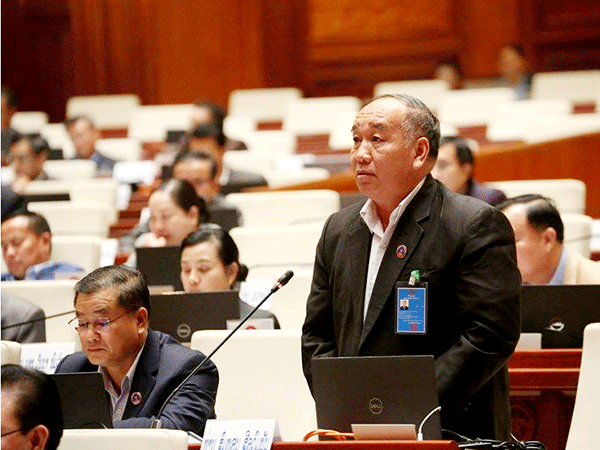 |
A National Assembly member takes part in a debate during the session. --Photo Paxason Newspaper
|
National Assembly urges govt to rethink on power price hike
The National Assembly (NA) has called on the government to urgently reconsider a recent hike in electricity price, warning that the increase is hurting families, threatening businesses, and weakening economic growth.
Speaking at the ongoing 9th Ordinary Session of the NA’s 9th Legislature on June 11, National Assembly President Xaysomphone Phomvihane said the current electricity pricing structure is placing too great a burden on households and industries.
He warned that high energy costs can hinder domestic production and add heavy burden on businesses.
The appeal follows a government decision to restructure electricity prices to better reflect the operating costs of Electricite du Laos (EDL), which has accumulated significant debt, which the state enterprise attributed to selling electricity to households at subsidised rates.
But many lawmakers are raising alarm over the move’s wider consequences.
An NA member for Savannakhet province, Mr Xayadeth Phuiyavong, said the price hike is already adding financial pressure on households and may drive up production costs for businesses, potentially reducing state revenues in the long term.
“Instead of boosting income, this policy could push companies to cut operations or close altogether,” he said during a debate on June 10.
Echoing those concerns, a member for Vientiane, Ms Valy Vetsaphong, said that even though EDL has to operate under limited conditions, it is unfair to let the public shoulder the burden of debt caused by ineffective management of the state enterprise.
In response, the Minister of Industry and Commerce, Mr Malaythong Kommasith, admitted the problem is complex and acknowledged that neither raising nor freezing electricity prices presents an easy way forward.
“Raising prices causes hardship, but keeping them low leaves no way out, ” he said.
Over the years, EDL has accumulated significant debt as it worked to maintain the country’s power infrastructure and expand the power grid to reach households in remote communities - an effort it describes not as a ‘commercial venture’ but as a responsibility of the state.
Mr Malaythong explained that to ease the strain caused by the recent rise in electricity price, the Ministry of Industry and Commerce plans to speed up study to better understand how the changes are affecting people’s lives and the economy.
Based on these findings, the ministry aims to propose targeted support measures for those who may be hit hardest, including civil servants, military personnel, police, low-income families, and other vulnerable groups.
At the same time, efforts are underway to keep basic living costs under control. This includes looking at ways to stabilise the prices of food and essential goods so that the impact of higher electricity costs does not ripple further through household expenses.
The ministry will work with EDL to improve management efficiency, reduce unnecessary spending, and cut power losses during transmission.
New sources of revenue are being explored, including investment partnerships and high-efficiency energy projects.
Looking ahead, the government is placing greater focus on diversifying energy sources for domestic use.
He also noted that the government will seek international financial support, including negotiations with creditors and new financial institutions, to restructure EDL’s debt and reduce the pressure of loan repayments.
By
Phonepaseuth Volakhoun
(Latest Update June 13, 2025)
|


